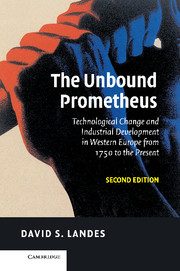 The Unbound Prometheus
The Unbound Prometheus 4 - Closing the gap
Published online by Cambridge University Press: 05 June 2014
Summary
The period from 1850 to 1873 was Continental industry's coming-of-age. It was a period of unprecedentedly rapid growth, which may be best conveyed—in the absence of year-by-year calculations of national income or product—by certain critical time series: railroad mileage, coal consumption or output, steam-power capacity, make of pig iron, consumption of raw cotton. In all these areas (with the exception of cotton, whose manufacture suffered a grievous setback in the 1860's), whether for France, Belgium, or Germany, the compound rate of increase runs between 5 and 10 per cent a year (see Table 4).
These were also years of technological maturation. They were marked in essence by the working-out on the Continent of those innovations that constitute the heart of the Industrial Revolution and had been developed and diffused in Britain a generation or more earlier. In textiles the self-actor and power loom replaced the mule and hand loom. The iron industry consummated the shift from vegetable to mineral fuel. The steam-engine sealed its triumph over the water wheel. The heavy chemical industry was firmly established and the technical possibilities of the salt-soda-acid complex exploited along the lines implicit in the Leblanc process. Finally, the machine spread ever more widely—into nail-making and the cutlery trade, the stamping of heavy metal forms, tailoring, the manufacture of paper, and other fields too numerous to list.
This description of the middle decades of the century as a period of technical maturation, of the working-out and diffusion of earlier developments, is not meant to imply that invention had ceased and that the gains of productivity were all made behind a stable technological frontier.
- Type
- Chapter
- Information
- The Unbound PrometheusTechnological Change and Industrial Development in Western Europe from 1750 to the Present, pp. 193 - 230Publisher: Cambridge University PressPrint publication year: 2003
- 1
- Cited by
